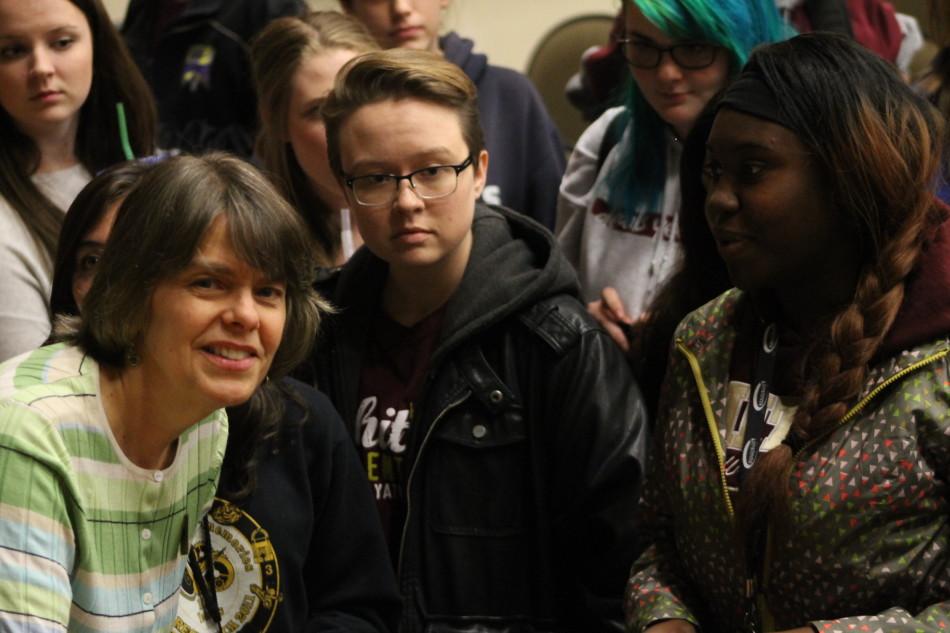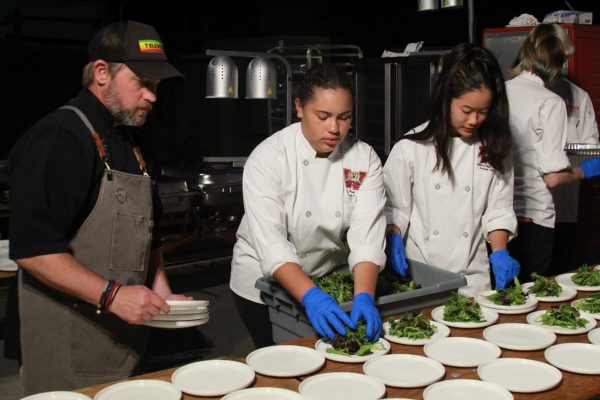Tinker Tour visits campus, promotes awareness for First Amendment
The 400 theater seats were filled April 1 as journalists from six high schools located all over the greater Sacramento area gathered to listen to free speech activist Mary Beth Tinker discuss their First Amendment rights. This school is one of four stops in California this week on the official Tinker Tour, where she travels across the nation to speak to students about the impact they can have by using their First Amendment rights.
About 48 years ago, Tinker stood her ground during the Vietnam war when she wore black armbands to school to protest peacefully. Despite losing her argument in District and Appeals Courts, she was persistent and her dedication caused her case to make it to Supreme Court. Her case, Tinker v. Des Moines, made history when she had finally won. The court ruling set the precedent for student freedoms and rights, and the most significant takeaway is that students and teachers do, in fact, have the protection of the First Amendment at school.
Tinker kept her message simple.
“It’s kind of fun standing up for what you believe in,” she said.
As everyone took their seats and media students spread out with cameras and recorders for live coverage, Whitney High Student Media adviser Mrs. Sarah Nichols called The Roar’s editor-in-chief Kavleen Singh to the stage. Singh began by speaking about the importance for having freedom to use words.
“In my four years with Whitney High Student Media, we have reported on two teacher arrests, bullying, online privacy, struggles with sexuality, smoking, body image, suicide, depression and a variety of other stories important to our readers. I am grateful for the freedom of speech and of the press afforded to us by the First Amendment and the California Educational Code that supports us in this responsibility. I also am grateful to have the resources available from the Student Press Law Center and to know that outside the gates of our school, other journalists are working just as hard to tell the important stories at their school — stories that take courage to find, hear, and deliver with fairness and accuracy to help improve communities and their audiences all around the world,” Singh said.
Despite technical difficulties with audio and a PowerPoint presentation that would not load, Tinker delivered her message with enthusiasm and received cheers and claps from the audience several times.
“I thought she was really energized and engaged with the audience and their response to what she was saying. Her overall deliverance was really strong, she was saying it simply enough so students can understand it,” Joel Timms said. “It didn’t change a lot of my perspective of the First Amendment, but it made me want to exercise those rights more.”
Tinker emphasized that she was just a regular teenager who was trying to do the right thing, yet was scared of getting in trouble. When her principal told her to remove the armband, that is exactly what she did. Yet she looked to her Methodist preacher father as an example, and remembered how he stood up for the rights of black children in the 1960’s who, for instance, were not allowed to share the swimming pool with white children. She continued to stress the importance of youth fighting for rights and equality, and encouraging teens to use their First Amendment securities.
“Our great ideas of freedom and equality, we had to get there somehow. And we had our secret weapon to do that. You guys,” Tinker said.
Although not officially part of her tour, Student Press Law Center’s Frank LoMonte joined Tinker on her visit to the school. As a legal expert and known First Amendment advocate in student media, LoMonte expressed concern over the future of the five freedoms.
“I’m really afraid that there are judges that will roll back your rights due to paranoia about social media. People adjust to the current situation regarding their rights and think that it won’t change, but it can. That’s why students need to be aware of their rights so they can preserve them,” LoMonte said.
After Tinker concluded her presentation, she welcomed students to talk to her as she sat on the edge of the stage, signing black armbands and taking notes what students had to say. She and LoMonte were interested in what students were passionate about and documented those ideas throughout their interactions, both with recordings and video on an iPad.
“She was a really down-to-earth person. Even though she changed people’s lives, she was still so humble about the whole thing. She knows that listening is an important part of understanding and helping people,” Theresa Kim said.
The tour was made possible entirely through crowdfunding efforts, first in a national StartSomeGood campaign and then through additional donations from around the country. The funds raised cover gas and vehicle fees as well as other miscellaneous expenses that occur when traveling. In order to help with the Tinker Tour’s funds in the west coast part of the tour, which kicked off last fall and hit much of the east coast, students donated another $400 for “freedom fuel,” so Tinker can continue spreading her message.
Tinker’s next stop is Monta Vista High School in Cupertino.
This Storify offers a recap of social media coverage from the event.
by KALEEN SINGH








![On the stage, Daniel Bozinovski and Rachel Treto play their part as Tom and Hannah in the show “The Cast List”. The show was about a group of students who were told about their cast list for the play “Romeo and Juliet.” The Theater I students were in preparation for their first showcase of the year. Students went over their lines during all of their class for the past two months. “[We put in] a lot of rehearsal, practicing lines, making sure you have everything memorized and making sure you are ready to go in and not forget anything,” Nathan Weeks said. Photo by Megan Kubas.](https://www.whitneyupdate.com/wp-content/uploads/2024/05/IMG_4085-600x396.jpg)
